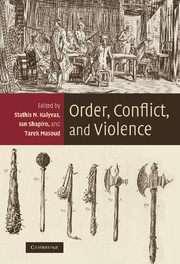Book contents
- Frontmatter
- Contents
- List of figures
- List of tables
- List of contributors
- Preface
- 1 Introduction: integrating the study of order, conflict, and violence
- Part 1 Creating, maintaining, and restoring order
- 2 Probing the sources of political order
- 3 Attaining social order in Iraq
- 4 Factors impeding the effectiveness of partition in South Asia and the Palestine Mandate
- 5 The social order of violence in Chicago and Stockholm neighborhoods: a comparative inquiry
- 6 Traditions of justice in war: the modern debate in historical perspective
- 7 Problems and prospects for democratic settlements: South Africa as a model for the Middle East and Northern Ireland?
- Part 2 Challenging, transforming, and destroying order
- Index
- References
3 - Attaining social order in Iraq
Published online by Cambridge University Press: 06 July 2010
- Frontmatter
- Contents
- List of figures
- List of tables
- List of contributors
- Preface
- 1 Introduction: integrating the study of order, conflict, and violence
- Part 1 Creating, maintaining, and restoring order
- 2 Probing the sources of political order
- 3 Attaining social order in Iraq
- 4 Factors impeding the effectiveness of partition in South Asia and the Palestine Mandate
- 5 The social order of violence in Chicago and Stockholm neighborhoods: a comparative inquiry
- 6 Traditions of justice in war: the modern debate in historical perspective
- 7 Problems and prospects for democratic settlements: South Africa as a model for the Middle East and Northern Ireland?
- Part 2 Challenging, transforming, and destroying order
- Index
- References
Summary
In the year 1918, Arnold Wilson, Acting Civil Commissioner of the territory now known as Iraq, faced a dilemma. A self-confident British colonial officer, Wilson was charged with the task of establishing social order in a well-armed, culturally heterogeneous population that had been liberated from centuries of Ottoman rule. As is often the case in the modern world, British governance was made more difficult by the population's hostility to its new foreign masters. The dilemma, as the colonial officer later recounted, was this:
Ought we to aim at a “bureaucratic” form of administration, such as that in force in Turkey and in Egypt, involving direct control by a central government, and the replacement of the powerful tribal confederation by the smaller tribal or sub-tribal unit, as a prelude to individual in place of communal ownership of land, or should our aim to be retain, and subject to official safeguards, to strengthen, the authority of tribal chiefs, and to make them the agents and official representatives of Government, within their respective areas? The latter policy had been already adopted, in default of a better one, in Basra wilayat, and especially in the Muntafiq division: was it wise to apply it to the Baghdad wilayat? Both policies had their advocates.
(Wilson 1931; emphasis added)After due deliberation, Wilson chose the first option. Two years later there was a massive rebellion and he was out of a job.
- Type
- Chapter
- Information
- Order, Conflict, and Violence , pp. 43 - 74Publisher: Cambridge University PressPrint publication year: 2008
References
- 3
- Cited by



